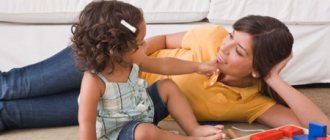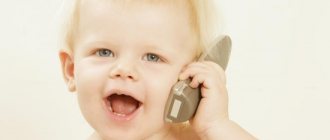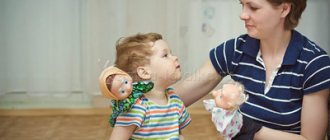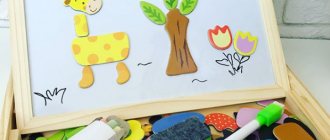If at the age of two the baby is still an observer, then at the age of three he becomes an inquisitive explorer of the world around him. The difficult task falls on the shoulders of mom and dad - to help the child gain the necessary experience and knowledge and at the same time, protect him from possible injuries. It is important to ensure that the baby develops harmoniously, both physically and mentally, and intellectually.
Physical development of the child
The main goal is to make the child stronger, more resilient, dexterous, and teach him to coordinate his movements well. Experts recommend doing the following exercises daily:
- stepping over small obstacles;
- walking on an inclined plane;
- jumping over a drawn line (like playing hopscotch);
- walking on a string placed on the floor;
- jumping forward on both legs;
- jumping from low heights.
It is very useful for three-year-old children to swim, dance, play various ball games, ride a bicycle, and perform various exercises on the children's sports wall. Be sure to teach your child to do morning exercises or do fitness with him.
Age characteristics
Each year of a baby’s life has its own characteristics. Until the age of 3, a child can be called completely unformed, but by the age of 3 he acquires age-related characteristics.
In the medical textbook of Professor R.R. Kildiyarova’s “Propaedeutics of Childhood Illnesses” writes what children aged 3 years do :
- define 4 primary colors;
- step over obstacles 8-14 cm high in alternating steps;
- in games they use “role”: “I am a mother”, “I am a doctor”;
- try to make complex sentences;
- dress, but with the help of an adult fasten buttons and tie shoelaces.
In addition, parents need to remember that it is at the age of 3 that children begin to actively develop and change.
Intellectual and creative development
At three years old, a child actively learns about surrounding objects and phenomena, explores his capabilities, and for this it is necessary to develop attention, logical thinking, memory, and imagination. What exercises will help?
- Search for the desired color by sample or name.
- Collecting nesting dolls, pyramids, molds of different sizes.
- Selection of volumetric and flat squares, circles, triangles and other geometric shapes.
- Games for the difference between the concepts of “small”, “large”, “medium”.
- Folding a picture-riddle: first from 2 two parts, then from 3-4 parts.
- Search for a whole picture by its piece.
- Generalization of objects according to the main characteristic: living-non-living, edible-inedible, etc.
- Game of mosaic, lotto, dominoes.
- Finding matches, for example, shadows and figures.
- Searching for an extra item in a group of other items.
- Adding missing details.
- Reading fairy tales together. If the child knows some letters, ask them to find them in the text.
Take every opportunity to teach your baby something new. For example, during a walk, tell him about trees, animals, phenomena, transport - in a word, about everything that you came across along the way.
The study of elementary mathematical concepts and numbers should take place in a playful way. Ensure that your child not only memorizes the names of numbers, but learns how to determine the number of objects.
To develop creative thinking, experts advise regularly performing the following exercises :
- playing with a construction set, cubes, creating structures based on a model;
- collecting simple puzzles;
- drawing and coloring with paints, pencils, felt-tip pens;
- drawing a variety of geometric shapes, you can use a stencil or pattern;
- modeling simple figures from plasticine, salt dough, clay;
- applications made from natural materials, colored paper and cardboard, magazine clippings;
- cutting along the contour with scissors, etc.
Children aged 3 enjoy playing story games, puppet theater, and participating in simple short dramatizations.
Speech development in a child up to 3 years old. How to develop a child's speech?
20.02.2020
From birth to 3 years, children have the most intensive stage of development; they acquire many new skills and improve them. If during this period you let the child’s development take its course, then in the future it will take much more effort to catch up.
Speech is the work of muscles and speech organs. And like any muscle, speech needs to be constantly trained and developed.
There are a number of factors that influence speech - a healthy pregnancy and childbirth , the correct formation and functioning of all systems of the child’s body, a favorable speech environment.
From 0 to 3 years. The main stages of speech in a child.
From 2 to 6 months - he gurgles, babbles, responds to his name, emits various intonations of crying.
From 6 to 12 months - begins to pronounce syllables, imitates adults, new consonant sounds , imitates familiar words.
Up to 1 year - the first words “mom” and “dad”, points with a pen to objects, understands the word “no”, knows the names of loved ones.
Up to 1.5 years - the baby knows 10-20 words, pronounces several words together, waves his hand, shakes his head, knows parts of the body and can show them, follows simple instructions.
Up to 2 years - sentences of 2 words, 50-100 words in stock, follows simple instructions, begins to say pronouns, abbreviates words, speech becomes understandable to others.
Up to 3 years - sentences of 3 words, 300-500 words in the vocabulary, follows instructions of two actions, begins to tell stories, the child talks to children and adults, can distort some sounds (hissing, whistling, vowels).
Tips for correct speech formation
- Respond to children's babbling, repeat after him and imitate his sounds .
- Talk to your baby throughout the day so that he constantly hears speech . Do not lisp, but clearly and clearly conduct a conversation with the child.
- Read colorful books every day, with intonation, with a change in voice.
- Walking with your child in different places makes him interested in learning about the new world around him. Kids are very inquisitive.
- When speaking, it is necessary to ensure eye contact.
- Concentrate the child's attention on new objects, animals and pronounce their names.
- Praise your child for saying new words.
- You need to listen carefully when your child talks to you.
- To better perceive new words, you need to use pictures.
- Let's listen to children's songs and fairy tales for the baby.
It is also very popular now to work with your baby using cards. Now there is a huge amount of this product on the market, with different themes. There are cards with animals, clothes, body parts, actions, fruits and vegetables, transport, etc. The essence of this game is that parents show cards to the child, pronouncing its name, then the child must say the name of the card himself. It is important not to make this a learning process; everything needs to be presented in the form of a game.
To summarize, parents should not judge their child's development rate based on the achievements of other children. It is important to remember: each child is individual and has his own pace of development. The goal of working with your child should be to help him develop his skills, and not to catch up with the development of other children.
Published in Defectology Premium Clinic
Speech development
Normally, a three-year-old child speaks about 1000 words well and can already speak well, so special attention should be paid to speech development. What can you do?
- Communicate with your child as much as possible, be interested in what he says.
- Perform articulation exercises daily. This will help you place the speech sounds correctly.
- Discuss the story pictures. A collection of fairy tales by Vladimir Suteev is ideal for classes.
- Learn poems and songs. Poetic riddles are a hit with kids.
Speech development is positively influenced by games and exercises that involve fine motor skills , for example:
- all kinds of games with cereals, beans, buttons, sand, shells, pasta, etc.;
- fastening buttons, lacing;
- finger gymnastics;
- origami;
- games with water.
Musical activities help develop speech hearing: singing, guessing familiar sounds, playing musical instruments, guessing songs, singing vowel sounds.
The causes of speech disorders can be:
- Unfavorable heredity and unhealthy lifestyle of future parents: occupational hazards, drug addiction, alcoholism and smoking, abortion.
- Adverse factors potentially affecting the child's future speech during pregnancy: toxicosis of pregnancy, acute and chronic diseases of the mother during pregnancy (influenza, rubella, kidney and heart failure, etc.), Rhesus conflict, falls and bruises of the mother during pregnancy, acute stressful situations, complications during childbirth.
- Unfavorable circumstances during early development: head injuries, concussions and bruises of the brain, inflammatory diseases of the brain (meningitis), untreated inflammatory diseases of the middle and inner ear, abnormalities in the structure of the jaws and teeth as a result of injuries.
- Social factors: bilingualism in the family, the presence of speech defects in people around the child, a situation where parents deliberately “adjust” to the child’s speech, “libble” with him or, on the contrary, are inattentive to the child’s speech.
So, you have discovered that your child does not pronounce all sounds correctly and he “swallows” some words. What to do in such cases? Contact a speech therapist immediately and do not wait until your child’s sound pronunciation “on its own” becomes normal! Most often, delayed speech development affects the entire development of the child - it does not allow him to fully communicate with peers, and aggravates the emotional and mental state of the child. However, if you help the child in time, using all methods of developing and activating speech, these serious problems can be successfully solved.
Social development
The development of social skills is especially important if the child does not go to kindergarten for some reason. To do this, encourage play and communication with other kids on the playground in the yard. In addition, teach your baby to be independent:
- give feasible tasks, for example, making the bed, putting away a toy, washing a plate after yourself;
- ask for help when you cook or clean;
- teach how to dress and undress, fasten shoes, neatly fold things;
- introduce the rules of behavior at the table, on the street, in a public place, at a party, etc.
- teach polite words: thank you, please, etc.
How to exercise at home?
The developmental lesson should take place in suitable conditions: in good lighting, in a ventilated room. The TV and computer need to be turned off, toys should be put away so that nothing distracts the baby. Make sure your child has had a good night's sleep, is not tired, and is not hungry or thirsty. Try to have your classes regularly, at the same time, because three-year-olds are very sensitive to changes in routine.
If a child refuses to complete the proposed tasks, do not force him, occupy him with something else. After some time, try again, most likely it will be successful.
Crisis of three years
The three-year crisis is considered the most turbulent in a child’s development, and it is a serious obstacle to regular developmental activities. Negativism, hysterics, stubbornness, ignoring requests, jealousy - you can encounter all this at any time. What to do in this case?
- Change your tactics and ignore the hysteria.
- Give your child more time to recover.
- Provide choice, or the illusion of it.
- Instead of forcing your child, offer help.
- Don't criticize or scold.
If you feel that you cannot cope with yourself and your child, seek the help of child psychologists and early development teachers. Most likely, in an unfamiliar environment the child will begin to behave more calmly. Classes in early development centers are held in small groups of up to 6 people, where children feel comfortable and receive a lot of attention.
Date of publication: 09/24/2018. Last modified: 01/13/2020.
Child’s speech at 3 years old: deviations
A child has deviations from the norm if he:
- Experiences serious difficulties when retelling, that is, he cannot remember the content of a short simple text that is age appropriate, such as “Kolobok”, “Ryaba Hen”, he understands it poorly, cannot formulate a thought;
- Incorrectly pronounces more than 5-7 sounds by the age of 4 (three-year-old children are still allowed to do this);
- Uses onomatopoeia and simplified versions of words instead of full ones;
- Has a small vocabulary;
- Has difficulty pronouncing words - repeats sounds or syllables (instead of a machine - mmmashina, instead of a cartoon - mumumultik);
- Talks too fast.
The last 2 points are sometimes associated with stuttering.
Have you noticed these problems in your child? It is worth considering seeing a speech therapist. Because in this case, parents often do not have the necessary knowledge and will not be able to help the child on their own.








